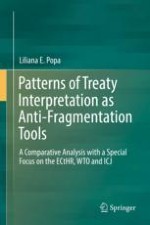2018 | OriginalPaper | Buchkapitel
6. Treaty Interpretation at the World Trade Organization
verfasst von : Liliana E. Popa
Erschienen in: Patterns of Treaty Interpretation as Anti-Fragmentation Tools
Aktivieren Sie unsere intelligente Suche, um passende Fachinhalte oder Patente zu finden.
Wählen Sie Textabschnitte aus um mit Künstlicher Intelligenz passenden Patente zu finden. powered by
Markieren Sie Textabschnitte, um KI-gestützt weitere passende Inhalte zu finden. powered by
